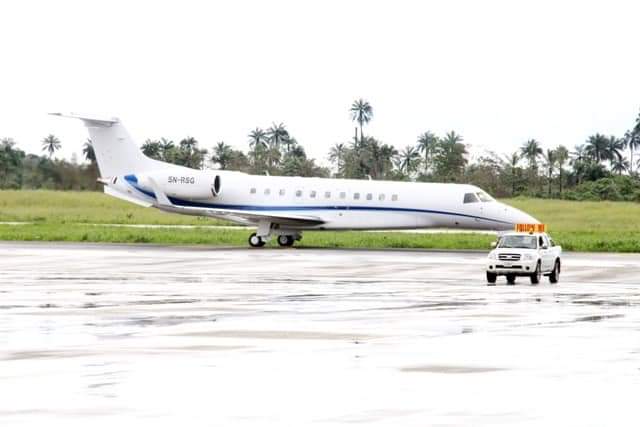Editorial
Why Neglect PH Int’l Airport?

In June, 2021, Nigeria’s Federal Government announced plans to concession four airports for 20-30 years. The airports include the Murtala Muhammed Airport (MMA), Lagos; the Nnamdi Azikiwe International Airport, Abuja; Malam Aminu Kano Airport, Kano, and Port Harcourt International Airport, Port Harcourt.
Penultimate Wednesday, the government announced the emergence of preferred and reserve bidders for three out of four airport and cargo terminals as approved for concession after the Request for Proposals (RFP) phase of the Nigeria Airports Concession Programme (NACP). Only Port Harcourt International Airport (PHIA) did not receive any proposals and as such has not had preferred and reserve bidders attached to it.
There is no doubt that the rejection of the airport by the bidders is connected to its poor infrastructure status, impeding it from properly operating as an international airport. Stakeholders in the aviation industry have been calling for the closure of the airport over safety concerns. Currently, there is lack of critical infrastructure on the runway, which makes landing at the airport very difficult, especially at night.
The number of serious incidents and accidents that had occurred at the airport over the years made it somewhat unsafe for flying. The runway lacks critical facilities, including Instrument Landing System (ILS), which guides aircraft to land, low-level wind shear indicators, which notifies the weather conditions, lack of comprehensive marking of the runway and taxiway. The absence of these facilities hamper safe airline operation.
Disappointingly, these facilities have been in poor state over the years and regrettably contributed to loss of lives and equipment in the past accidents and incidents that had taken place at the airport. There is every need for the rehabilitation of the critical facilities and equipment that will enhance safe air operations to instil confidence in passengers and users of the airfield.
Most of the accidents that happened at the airport were identical and preventable if the Nigerian Civil Aviation Authority (NCAA) and other aviation agencies had performed their duties creditably. It is important to know how often the calibration exercise of flying equipment, especially at the Port Harcourt airport, is effected. Such exercise ought to be carried out every six months.
The stretch of road from the domestic wing to the international wing which goes further into the airport communities has turned into not only an eyesore but a source of threat to passengers and other users. This seems to make a mess of the glittering facilities of the airport. Users have continued to express apprehension over the intimidating darkness that envelops the area at night, with attendant attacks by hoodlums and other criminal elements.
Even though it is designated a federal infrastructure, the Rivers State Governor, Nyesom Wike, offered to rescue the entire ageing road from the Port Harcourt–Owerri highway to the international airport at Omagwa. Governor Wike also pledged that the state government would make critical interventions at the airport to improve the international acceptance of the facility by building a VIP lounge. That promise was fulfilled recently.
A few years ago, the Port Harcourt airport was listed third worst airport in the world. This poor ranking, which gave the country bad press, can hardly be blamed on foreign media prejudice. Anyone familiar with the airport will easily concur with the dismal rating, especially when compared to the experience at airports in some other parts of the world. Additionally, aggressive corruption is the biggest problem, with airport officials and staff demanding bribes for pretty much everything.
Recall that the Federal Government embarked on an ambitious project of constructing five new international terminals at the nation’s five international airports including Lagos, Abuja, Kano, Port Harcourt and Enugu during the tenure of the then Minister of Aviation, Princess Stella Oduah. The deplorable state of our airports, then, prompted the launch of the Airport Re-modeling and Rehabilitation programme in 2012. The work stopped at 30 per cent stage in Port Harcourt.
The airport is poorly maintained and inefficiently run. The air conditioners at the arrival and departure halls often fail to work. The toilets are sometimes either locked up, without running water or unserviceable. The conveyor belts function intermittently, sometimes leaving passengers waiting for long before they can collect their luggage. With those objective deficiencies, how can anyone honestly bid for this airport?
Our aviation authorities and the Federal Government have to wake up and address these challenges. With a bushy and dirty environment, the Port Harcourt airport gives the nation a bad image, and the earlier the authorities wake up to the sad reality, the better for the country. It is sad that Rivers State always gets unfair treatment from the federal, despite its economic significance to the nation.
The lack of proposals for the Port Harcourt airport is worrisome and therefore unacceptable. The Minister of Aviation, Hadi Sirika, must act immediately to remedy this embarrassing situation. Sirika should put the next stage of the programme, which is negotiations and due diligence, on hold and quickly consult the Infrastructure Concession Regulatory Commission (ICRC) on the issue. Efforts must be made by the authorities to upgrade the airport and qualify it for bidding.
Editorial
Resolve Rumuwoji Market Issues, Others

Editorial
As NDG Ends Season 2

Editorial
Beginning A New Dawn At RSNC

-

 News5 days ago
News5 days agoAmend Constitution To Accommodate State Police, Tinubu Tells Senators
-

 Politics5 days ago
Politics5 days agoSenate Urges Tinubu To Sack CAC Boss
-

 News5 days ago
News5 days agoDisu Takes Over As New IGP …Declares Total War On Corruption, Impunity
-
Politics2 days ago
2027: NIGERIANS FAULT INEC ON DIGITAL MEMBERSHIP REGISTER DIRECTIVE
-

 Environment2 days ago
Environment2 days agoLAWMA Director Says Sweeping Reforms Have Improved Waste Collection
-

 Featured5 days ago
Featured5 days agoFubara Reads Riot Act To New SSG, CoS …Warns Against Unauthorized Meetings
-
Rivers5 days ago
CareerFest 2026 Begins In PH Today
-
Politics2 days ago
LP Crisis: Ex-NWC Member Dumps Dumps Abure Faction

